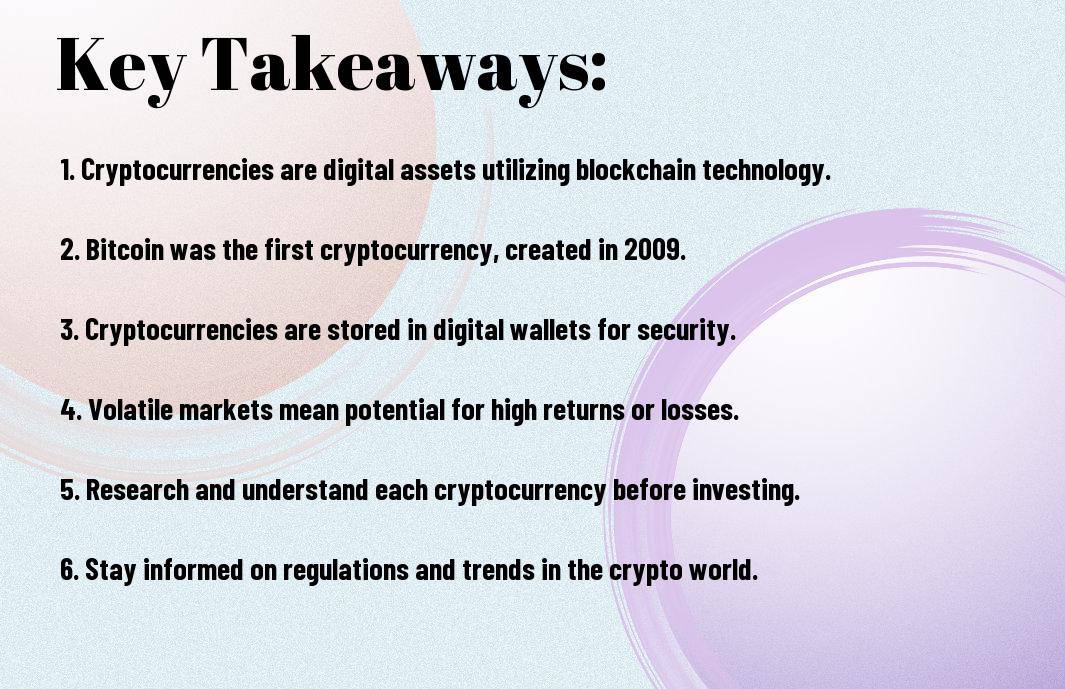Most individuals today have heard about cryptocurrencies, but the world of digital assets can still be a confusing and daunting space for new investors. Understanding the basics of crypto is crucial before submerging into this fast-paced and volatile market. In this blog post, we will break down the key concepts and fundamentals of cryptocurrencies to help simplify the complexities for those looking to invest in this innovative financial technology.

Key Takeaways:
- Cryptocurrencies Basics: Understanding the basic concepts of cryptocurrencies like blockchain technology, decentralization, and security is crucial for new investors.
- Market Volatility: The cryptocurrency market can be highly volatile, so it’s important for new investors to be prepared for price fluctuations.
- Research is Key: Before investing in any cryptocurrency, it’s important to do thorough research on the project, team, technology, and market trends.
- Security Measures: Implementing strong security measures like using hardware wallets, two-factor authentication, and avoiding sharing personal information is necessary to protect your investments.
- Diversification Strategy: Diversifying your cryptocurrency portfolio by investing in different assets can help mitigate risk and maximize returns.
- Long-Term vs. Short-Term Investment: Understanding the difference between long-term investment strategies and short-term trading can help new investors make informed decisions based on their financial goals.
- Seek Professional Advice: Consulting with financial advisors or experienced cryptocurrency investors can provide valuable insights and guidance for new investors entering the crypto market.


Understanding Cryptocurrency Basics
While venturing into the world of cryptocurrency may seem daunting at first, it’s vital to start with the basics. For new investors, understanding the fundamentals is crucial to making informed decisions in this rapidly growing market. For a comprehensive guide on the ABCs of crypto, I recommend checking out The ABCs of Crypto Report for detailed insights and analysis.
What is Cryptocurrency?
Cryptocurrency is a digital or virtual form of currency that uses cryptography for security. Unlike traditional currencies issued by governments, cryptocurrencies operate on decentralized networks based on blockchain technology. This allows for secure, transparent, and immutable transactions without the need for intermediaries like banks.
How Cryptocurrencies Work
Understanding how cryptocurrencies work is vital for grasping their potential. At the core of cryptocurrencies is the concept of decentralized peer-to-peer transactions. Digital currencies use blockchain technology to record transactions across a network of computers, ensuring transparency and security. One of the most significant advantages of cryptocurrencies is their decentralized nature, which removes the need for central authorities and provides users with more control over their funds. However, this decentralized nature also poses risks, as transactions are irreversible and susceptible to hacking or fraud.

The World of Bitcoin: The Pioneer Cryptocurrency
The Origins and History of Bitcoin
Unlike traditional currencies issued by governments and central banks, Bitcoin is a decentralized digital currency that operates on a peer-to-peer network. It was introduced in a 2008 whitepaper by a mysterious person or group known as Satoshi Nakamoto. The first Bitcoin transaction took place in 2009 when Nakamoto mined the first block of the chain, known as the genesis block.
Investing in Bitcoin
The origins of Bitcoin as a means of exchange can be traced back to its creation in response to the financial crisis of 2008. Over the years, Bitcoin has gained significant attention as a valuable investment asset, attracting both individual and institutional investors. Investing in Bitcoin involves purchasing the cryptocurrency with the expectation that its value will increase over time, allowing investors to profit from price fluctuations in the market.
History: One of the most significant events in Bitcoin’s history was its rapid price appreciation in 2017, when its value soared to nearly $20,000 per coin before experiencing a sharp correction. This volatility is a key aspect of investing in Bitcoin, as prices can fluctuate dramatically in a short period. However, despite the risks, Bitcoin has also provided early investors with substantial returns over the years, making it an attractive investment option for those willing to stomach the volatility.
Beyond Bitcoin: Exploring Altcoins
Keep in mind that Altcoins refer to any cryptocurrency other than Bitcoin. With thousands of different Altcoins available in the market, it can be challenging for new investors to navigate this space. However, exploring Altcoins can offer unique investment opportunities beyond the well-known Bitcoin.
Types of Altcoins
In the context of Altcoins, there are various types that serve different purposes. Some Altcoins are created as alternatives to Bitcoin, aiming to improve upon its limitations. Others focus on privacy and security features, while some are designed for specific use cases like decentralized applications or smart contracts. Understanding the different types of Altcoins can help investors make informed decisions based on their investment goals.
| Category | Description |
| Fork Coins | Derived from Bitcoin’s source code with alterations |
| Privacy Coins | Focus on anonymity and confidentiality |
| Utility Tokens | Used to access specific services or products within a platform |
| Security Tokens | Represent ownership of assets or shares of a company |
| Stablecoins | Pegged to stable assets like fiat currencies to minimize volatility |
Thou, it is crucial for investors to conduct thorough research before investing in any Altcoins to understand their functionality and potential risks.
Investing in Altcoins
Tokens are a type of digital asset that can represent a fraction of a cryptocurrency, a voting right, or a commodity. When investing in Altcoins, investors typically purchase tokens associated with a specific project or platform. These tokens can provide access to services or products within the ecosystem or offer voting rights on future developments.
With Altcoins, investors have the opportunity to diversify their portfolios beyond Bitcoin and potentially achieve higher returns. Importantly, it is imperative to carefully assess the credibility of the project, the team behind it, and the market demand for the token. Thou investing in Altcoins can be lucrative, it also comes with higher risks due to the volatility and regulatory uncertainties in the cryptocurrency market.
Initial Coin Offerings (ICOs) and Token Sales
Now, before we research deeper into Initial Coin Offerings (ICOs) and Token Sales, I recommend checking out The ABC’s of Bitcoin. A three-step primer on the Daddy of… for a foundational understanding of cryptocurrencies.
What are ICOs?
What exactly are ICOs? ICOs are a fundraising method in which new projects sell their underlying crypto tokens in exchange for Bitcoin, Ethereum, or other digital currencies. These tokens represent a stake in the project and can be used for various purposes within the project’s ecosystem. ICOs gained popularity due to their ability to raise funds quickly without the need for traditional venture capital.
How to Assess ICOs
ICOs can offer lucrative investment opportunities, but they also come with significant risks. When evaluating an ICO, it’s crucial to conduct thorough research on the project, team, technology, and token utility. Look for transparency in the project’s whitepaper, experience and track record of the team, real-world applications of the technology, and community engagement. Additionally, consider factors such as regulatory compliance, market demand, and competition in the space.
This way, investors can make informed decisions and mitigate the potential risks associated with participating in ICOs.
The Regulatory Environment
Global Cryptocurrency Regulations
Many investors are drawn to cryptocurrencies due to their decentralized nature and potential for high returns. However, the regulatory environment in the cryptocurrency market is complex and ever-evolving. Regulations vary significantly from country to country, with some embracing cryptocurrencies and others imposing strict limitations or outright bans.
Legal Implications for Investors
To navigate the world of cryptocurrency investment safely, it’s crucial for investors to understand the Regulations that govern the market. Legal implications can arise in various areas, including taxation, securities laws, and anti-money laundering regulations. Failure to comply with these laws can result in penalties, fines, or even criminal charges.
Plus, investors must be wary of potential scams, fraudulent schemes, and hacking attacks prevalent in the cryptocurrency space. Conduct thorough research, seek advice from legal professionals, and stay informed about the latest Regulations to protect your investments and mitigate risks.
The Future of Cryptocurrencies
Once again, we examine into the world of cryptocurrencies to explore the potential future landscape of this rapidly evolving industry. The future of cryptocurrencies holds both exciting opportunities and daunting challenges that will shape the digital financial ecosystem for years to come. Let’s take a closer look at what lies ahead.
Emerging Trends in the Crypto Space
An emerging trend in the crypto space is the growing acceptance and adoption of cryptocurrencies by mainstream financial institutions and corporations. Companies like Tesla and PayPal have made significant investments in Bitcoin, signaling a shift towards widespread acceptance of digital currencies. Additionally, the rise of decentralized finance (DeFi) platforms is revolutionizing traditional financial services by offering decentralized lending, borrowing, and trading services.
Future Challenges and Opportunities
Opportunities abound in the crypto space as advancements in blockchain technology continue to drive innovation in various sectors. From supply chain management to healthcare, blockchain is being explored for its potential to increase transparency, security, and efficiency in operations. However, with these opportunities come challenges such as regulatory uncertainty, cybersecurity threats, and scalability issues that must be addressed to ensure the long-term success of cryptocurrencies.
One of the key challenges facing the future of cryptocurrencies is the need for regulatory clarity to foster trust and mainstream adoption. Governments around the world are still grappling with how to regulate digital currencies, which has led to uncertainty and skepticism among investors and businesses. As the industry matures, establishing clear regulatory frameworks will be crucial to ensuring the stability and legitimacy of cryptocurrencies in the global financial ecosystem.
Building Your Cryptocurrency Portfolio
For a new investor entering the world of cryptocurrencies, it can be overwhelming to navigate through the vast amount of information available. Before entering into the market, it’s imperative to understand the fundamentals of cryptocurrency. You can brush up on your knowledge by exploring resources like The ABCs of Cryptocurrency: Terms You Need to Know. This will give you a solid foundation to start building your cryptocurrency portfolio.
Developing an Investment Strategy
Building a successful cryptocurrency portfolio starts with developing a sound investment strategy. Research various cryptocurrencies and analyze their potential growth and risks. Diversification is key – spreading your investment across different cryptocurrencies can help mitigate risk. Set clear investment goals and determine your risk tolerance to tailor your strategy to suit your financial objectives.
Staying Informed and Up-to-Date
Strategy
Staying informed and up-to-date with the latest news and trends in the cryptocurrency market is crucial for making informed investment decisions. Market volatility in the crypto space requires investors to stay vigilant and adapt to changes swiftly. Follow reputable cryptocurrency news sources, join online forums, and engage with the community to stay abreast of developments. Keeping a close eye on market trends and regulatory changes can help you navigate the ever-evolving landscape of cryptocurrencies.
Summing up
From above, it is evident that understanding the ABCs of Crypto is imperative for new investors looking to navigate the world of cryptocurrencies. By simplifying the complex jargon and concepts associated with digital currencies, individuals can make confident and informed decisions when entering this space. By grasping the basics such as blockchain technology, key terms, and notable cryptocurrencies, investors can build a solid foundation to support their cryptocurrency journey.
As the popularity of cryptocurrencies continues to grow, having a grasp of the fundamental concepts is crucial for new investors. By laying the groundwork with the ABCs of Crypto, individuals can develop the knowledge and confidence needed to explore the opportunities and risks within the cryptocurrency market. With further research and engagement with the evolving landscape of digital assets, investors can position themselves for success in this dynamic and groundbreaking field.
FAQ
Q: What is cryptocurrency?
A: Cryptocurrency is a digital or virtual form of money that uses cryptography for security. It operates independently of a central authority like a government or bank.
Q: Why should new investors consider cryptocurrencies?
A: Cryptocurrencies offer diversification in investment portfolios, potential for high returns, and a hedge against inflation compared to traditional assets.
Q: How do I buy cryptocurrencies?
A: You can buy cryptocurrencies on online cryptocurrency exchanges using fiat currency or other cryptocurrencies. Simply create an account, deposit funds, and place an order.
Q: What is blockchain technology?
A: Blockchain is the underlying technology behind cryptocurrencies. It is a decentralized, distributed ledger that records transactions across a network of computers in a secure and transparent manner.
Q: How can I securely store my cryptocurrencies?
A: You can store your cryptocurrencies in digital wallets, which come in various forms such as hardware wallets, software wallets, and paper wallets. Hardware wallets are considered the most secure option.
Q: What are the risks associated with investing in cryptocurrencies?
A: Cryptocurrency investments are highly volatile and speculative, making them subject to price fluctuations and regulatory changes. There is also a risk of hacking, fraud, and market manipulation.
Q: How can I stay informed about the cryptocurrency market?
A: You can stay informed by following reputable cryptocurrency news sources, joining online communities and forums, and conducting your own research before making investment decisions.



